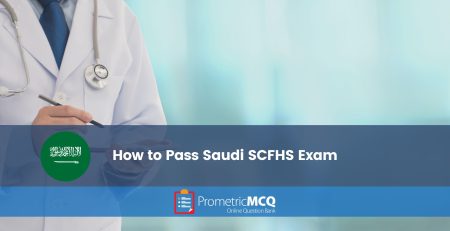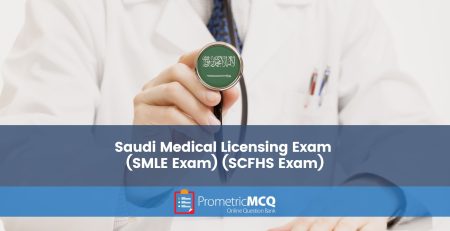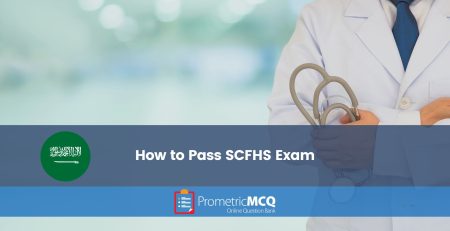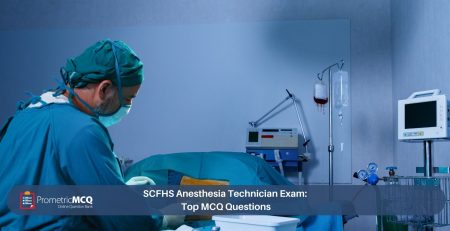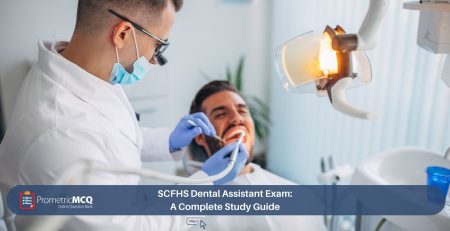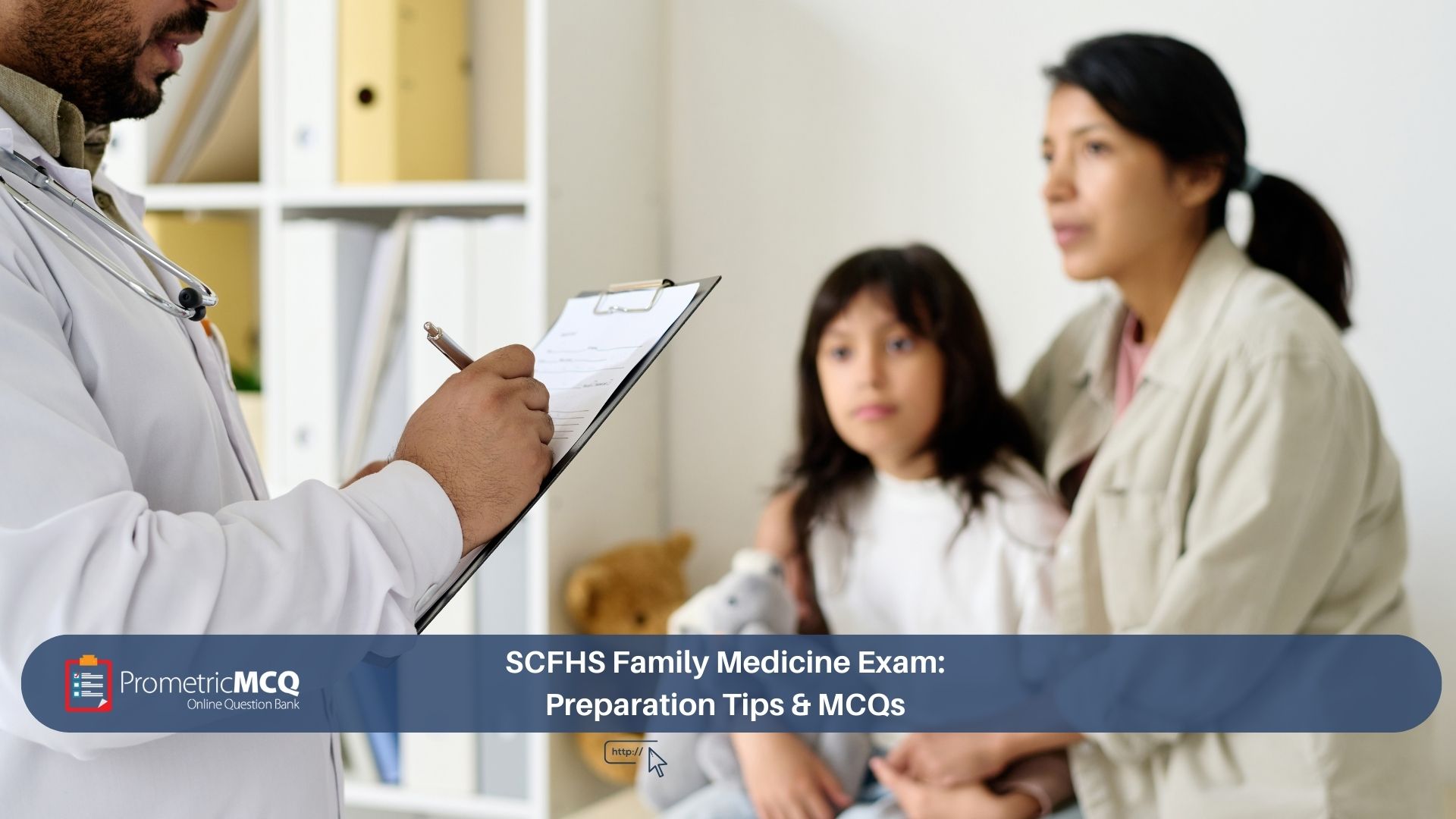
SCFHS Family Medicine Exam: Preparation Tips & MCQs
fatima@prometricmcq.com2025-09-29T23:09:03+00:00Table of Contents
ToggleSCFHS Family Medicine Exam: Preparation Tips & MCQs (2025)
Family Medicine is the cornerstone of the healthcare system in the Kingdom of Saudi Arabia, providing comprehensive, continuous, and patient-centered care. To ensure that practitioners in this vital specialty meet the highest standards of excellence, the Saudi Commission for Health Specialties (SCFHS) administers the Family Medicine Specialty Exam. This Prometric-based test is a rigorous and challenging assessment that goes far beyond the general SMLE, delving deep into the specific competencies, knowledge base, and unique philosophy of family practice.
Success on the SCFHS Family Medicine exam requires more than just a broad knowledge of medicine. It demands a specialized mindset focused on the biopsychosocial model, preventive care, and the management of chronic diseases across the entire human lifespan. The exam is composed entirely of case-based Multiple-Choice Questions (MCQs) designed to test your ability to integrate knowledge, manage undifferentiated problems, and make sound clinical decisions in a primary care setting. Mastering this exam requires a preparation strategy that is as comprehensive and integrated as the specialty itself.
This ultimate 2025 guide is your definitive resource for conquering the SCFHS Family Medicine exam. We will provide a detailed breakdown of the exam’s pattern, a high-yield exploration of the core syllabus domains, and a series of expert preparation tips. This is followed by a collection of realistic, exam-style MCQs with in-depth rationales to sharpen your clinical reasoning. Finally, a robust 10-point FAQ section will address all your critical questions, providing a clear path from preparation to passing.
Key Takeaways for the SCFHS Family Medicine Exam
- Think Like a Family Physician: The exam tests the breadth of knowledge from pediatrics to geriatrics, with a focus on continuity of care and the patient’s family context.
- Master Chronic Disease Management: A huge portion of the exam is dedicated to the long-term, guideline-driven management of conditions like diabetes, hypertension, and asthma.
- Preventive Medicine is High-Yield: Know your screening guidelines (e.g., for cancer, cardiovascular risk) and vaccination schedules inside and out.
- Guideline-Driven Answers are Key: Your choices must align with the latest international, evidence-based guidelines from major family medicine and specialty bodies.
- Specialty-Specific MCQs are Essential: Your success depends on practicing with a question bank designed for the Family Medicine specialty, not a general medical QBank.
Deconstructing the SCFHS Family Medicine Exam: Pattern and Syllabus
A successful study plan is built on a clear understanding of the exam’s architecture. The Family Medicine exam follows the standardized Prometric format for SCFHS specialty exams, a crucial component of your overall SCFHS exam passing strategy.
Core Exam Framework
- Administrator: Prometric
- Format: Computer-Based Test (CBT) with 100% MCQs.
- Structure: Typically 300 MCQs, divided into two sections of 150 questions each.
- Duration: A total of 6 hours of testing time (3 hours per section), with an optional scheduled break.
- Scoring: The exam is scored out of 800, with a passing score of 500. There is no negative marking.
High-Yield Family Medicine Syllabus Breakdown
The exam is designed to cover the full spectrum of family practice. A strategic plan focuses on these core domains.
| Family Medicine Domain | High-Yield Topics and Key Concepts for 2025 |
|---|---|
| Management of Chronic Diseases | ~30-40%: This is the largest domain. It includes the comprehensive, long-term management of Diabetes Mellitus (including lifestyle, oral agents, and insulin), Hypertension, Dyslipidemia, Asthma, COPD, Osteoporosis, and Chronic Kidney Disease. Focus on guideline-based targets and treatment escalation. |
| Management of Acute/Common Problems | ~20-25%: This covers the undifferentiated patient. Includes common presentations in MSK (low back pain, shoulder pain), GI (dyspepsia, viral gastroenteritis), ENT (otitis media, sinusitis), and Dermatology (eczema, acne, common infections). |
| Preventive Medicine & Screening | ~15-20%: This is a critically important area. You must know adult and childhood immunization schedules, and cancer screening guidelines (breast, cervical, colorectal, lung). Cardiovascular risk assessment and counseling on lifestyle modification are also key. |
| Pediatrics | ~10-15%: Well-child visits (developmental milestones, anticipatory guidance), management of common pediatric illnesses (e.g., AOM, pharyngitis, bronchiolitis), and growth chart interpretation. |
| Women’s Health | ~5-10%: Routine antenatal care, contraception counseling, management of common gynecological issues (e.g., vaginitis, abnormal uterine bleeding), and menopause management. |
| Mental Health & Ethics | ~5%: Diagnosis and first-line management of depression and anxiety in a primary care setting. Principles of medical ethics, patient confidentiality, and professionalism. |
High-Yield SCFHS Family Medicine MCQs: Free Practice Questions
This mock test is designed to reflect the clinical reasoning and breadth of knowledge required for the SCFHS Family Medicine exam. Engage with each case, formulate your answer, and then carefully study the rationale. For comprehensive preparation, a dedicated bank of SCFHS Family Medicine Exam MCQs is your most vital tool.
Question 1: Chronic Disease Management (Diabetes)
A 58-year-old man with a 10-year history of type 2 diabetes and hypertension returns for follow-up. His current medications include metformin 1g BID, lisinopril 20mg daily, and atorvastatin 40mg daily. His HbA1c is 8.2%, and his blood pressure is 135/85 mmHg. He has no history of heart failure, but a recent urine test showed a urine albumin-to-creatinine ratio (UACR) of 50 mg/g. According to the latest guidelines, which of the following is the most appropriate addition to his regimen?
- Glipizide
- Sitagliptin
- Empagliflozin
- Basal insulin
Correct Answer: C (Empagliflozin)
Rationale: This is an advanced, guideline-based question. The patient has inadequately controlled diabetes and, crucially, has evidence of early diabetic kidney disease (microalbuminuria, indicated by a UACR >30 mg/g). Current international diabetes guidelines (like those from the ADA) strongly recommend the use of an SGLT-2 inhibitor (like empagliflozin or canagliflozin) or a GLP-1 receptor agonist in patients with type 2 diabetes and established kidney disease or heart failure, due to their proven cardiorenal benefits, independent of their glucose-lowering effects. Empagliflozin will not only help lower his HbA1c but will also provide significant protection against the progression of his kidney disease.
Why other options are incorrect:
A: Glipizide (a sulfonylurea) would lower his HbA1c but carries a risk of hypoglycemia and is weight-positive. It offers no specific cardiorenal benefits.
B: Sitagliptin (a DPP-4 inhibitor) is a safe option for glucose lowering but is considered cardiorenal-neutral and is not the preferred agent in this specific clinical context.
D: Basal insulin would effectively lower his glucose but does not provide the specific organ protection that an SGLT-2 inhibitor would in this patient.
Question 2: Preventive Medicine
A healthy 55-year-old woman with no family history of cancer comes to your clinic for a routine check-up and asks about cancer screening. She had a normal Pap smear 2 years ago. According to current international guidelines (e.g., USPSTF), which of the following screening tests is most appropriate to recommend at this visit?
- Annual mammogram
- Low-dose CT scan of the chest
- Colonoscopy
- CA-125 blood test
Correct Answer: C (Colonoscopy)
Rationale: This question tests your knowledge of standard preventive screening schedules for an average-risk individual. For colorectal cancer, screening is recommended to begin at age 45 or 50 for average-risk individuals. At age 55, this patient is overdue for her initial screening. Colonoscopy every 10 years is the preferred screening modality. For breast cancer, mammograms are typically recommended biennially (every 2 years) for women aged 50-74, so an annual one is not standard. A low-dose CT is only for high-risk smokers. CA-125 is not a screening test for ovarian cancer in the general population.
Why other options are incorrect:
A: While mammography is indicated, the standard interval is typically every 2 years, not annually, for average-risk women in this age group.
B: Low-dose CT is only for lung cancer screening in individuals with a significant smoking history.
D: CA-125 is a tumor marker, not a screening tool, and has a very low positive predictive value in asymptomatic, average-risk women.
Frequently Asked Questions (FAQs) for the SCFHS Family Medicine Exam
The SCFHS uses a standardized scoring system where the exam is scored out of 800. The official passing score required to pass is 500.
The SMLE is for General Physicians and covers the core medical disciplines broadly. The Family Medicine exam is a specialty test that assesses the specific competencies of a family physician. This includes a much heavier emphasis on preventive care, continuity of care, the biopsychosocial model, and the management of chronic conditions across all age groups.
Your primary resources should be a cornerstone textbook of family medicine (e.g., *Rakel and Rakel’s Textbook of Family Medicine*), up-to-date clinical practice guidelines from major bodies (e.g., AAFP, USPSTF), and, most critically, a high-quality question bank designed specifically for the Family Medicine specialty.
The exam is based on international, evidence-based standards. While being aware of local epidemiology is useful, your study should focus on globally accepted guidelines from North American and European societies. Authoritative sources like the American Academy of Family Physicians (AAFP) Clinical Recommendations page are excellent resources.
Given the breadth of the specialty, a dedicated study period of 4 to 6 months is generally recommended to thoroughly review all major domains and complete a comprehensive question bank.
Yes, Primary Source Verification (PSV) by DataFlow is a mandatory part of the SCFHS credentialing process for all healthcare professionals, including specialists. Your medical degree, residency/specialty training, and experience certificates must be verified before your final Saudi SCFHS license can be issued.
The SCFHS typically allows candidates four attempts to pass their specialty board exams. It is essential to check the official SCFHS website for the most current regulations regarding waiting periods between attempts.
Ethical questions are often integrated into clinical vignettes. You might be presented with a scenario involving patient confidentiality, informed consent, or a conflict of interest and asked to choose the most professional and ethical course of action.
Train for it like a marathon. Use the scheduled break to rest, hydrate, and have a light snack. During the test, use a three-pass approach: answer easy questions first, then return to harder, flagged questions. This builds confidence and ensures you don’t miss easy points.
Use the syllabus breakdown as your guide. Dedicate the largest blocks of your study time to chronic disease management and preventive medicine, as these are the most heavily weighted areas. Use your QBank performance analytics to identify your weak areas and focus your review there.
Conclusion: Your Path to a Family Medicine Career in Saudi Arabia
The SCFHS Family Medicine exam is a comprehensive assessment designed to certify physicians who embody the principles of this essential specialty. It is a challenging examination that rewards a holistic, evidence-based, and patient-centered approach to medicine. By building your preparation on a foundation of the latest clinical guidelines and dedicating yourself to a rigorous practice schedule with high-quality, specialty-specific MCQs, you can master the content and the mindset required to succeed. Passing this exam is the definitive step toward a rewarding career as a family physician in the Kingdom of Saudi Arabia.
Ready to Master the Breadth of Family Medicine and Ace Your Exam?
Our comprehensive Family Medicine MCQ package is filled with high-yield clinical cases, guideline-based rationales, and simulated exams designed to cover the entire SCFHS syllabus and ensure you pass with confidence.

